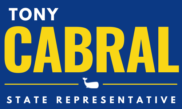Three Ways to improve state's public records law
Antonio F. D. Cabral, “Three Ways to Improve State’s Public Records Law,” The Standard Times, March 12, 2019 (link)
We have a collective obligation to preserve an open and transparent government and, if implemented, these three proposed legislative changes will help us move closer towards the goal of full participation and accessibility in our democratic processes.
State Representative Antonio F.D. Cabral represents the the 13th Bristol District in the downtown and south and west ends of New Bedford. He is the chairman of the House Committee on Bonding, Capital Expenditures and State Assets.
Across all levels of government, the ideals of transparency and freedom of the press have garnered widespread attention at this unique time in our democracy. Now more than ever, Sunshine Week — when the entire country reflects then develops solutions to secrecy and inaccessibility of government — must be recognized.
After years of advocacy, Massachusetts has made notable progress on this front, particularly with the passage of comprehensive public records reform in 2016 that featured a number of my original proposals. That said, we can always do more. This legislative session, I’ve focused on three areas — access to public records, the open meeting law, and “show cause hearings” — where we can surpass the progress we’ve made and further improve the way our Commonwealth functions.
Public Records
Today, Massachusetts’ public records can be accessed electronically. And recent changes to the law made the fees charged for public access of records more equitable, and the risks associated with not complying with the law more significant for state agencies and municipalities. However, certain organizational concerns still create capacity-related issues. I filed a bill this session that would fix this by creating a commission of public records, similar to the Open Meeting Law Advisory Commission that reports to the Attorney General’s Office. With improved oversight and enforcement powers, this proposed commission would serve as the appropriate means to improve upon the successful 2016 reform.
Open Meeting Law
The Massachusetts Open Meeting Law ensures that government entities, such as school committees, meet and deliberate in a way that is accessible to the public. This law requires timely public meeting notices and distributable meeting minutes so that the public is aware and engaged to the fullest extent possible. Unfortunately, issues around enforcement of these provisions remain. Even when public entities violate the Open Meeting Law, they can only be fined when their actions are deemed “intentional.” This “intentional violation” threshold was originally meant to apply to individuals within a public body, but after subsequent reforms took shape, public entities as a whole fell under the standard. And because it is a significant challenge to prove the intent of all members of a particular public board or committee, out of the thousands of complaints received since 2010, scarcely any have resulted in actual fines. I’m proposing to eliminate this enforcement barrier, ensuring that each public body within the Commonwealth has every reason to comply with the Open Meeting Law.
Show Cause Hearings
In the fall of 2018, the Boston Globe’s Spotlight team revealed a unique and troubling feature of Massachusetts’ court proceedings, known as “show cause hearings.” Massachusetts remains the only state where, behind closed doors, a clerk magistrate can decide whether criminal charges against an individual are dismissed or brought to trial. The Spotlight team found a number of cases where criminal charges were dropped without any record of what transpired between the defendant and the presiding clerk magistrate.
With support from the Massachusetts Newspaper Publishers Association, I filed legislation to make these hearings public unless a clerk magistrate successfully argues that the defendant’s privacy outweighs the public’s “right of access.” As written, the bill would also require that these hearings be recorded, to preserve the record. Without these protections, our judicial system is predisposed to mistreat individuals based on their race, gender, and other identifiers, simply because there is no information for the public to critique and analyze. We need a record of these hearings; we cannot fine-tune our judicial system without knowing the present outcomes.
We have a collective obligation to preserve an open and transparent government and, if implemented, these three proposed legislative changes will help us move closer towards the goal of full participation and accessibility in our democratic processes.
